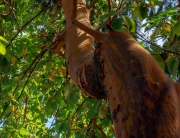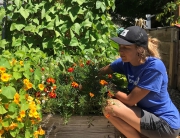Project studies if soils are safe for inner city gardening
>> Marika Smith
The Healing City Soils Project has had a successful first year! The project, a partnership between the Victoria Compost Education Centre and Royal Roads University offered free soil testing for heavy metals such as lead, arsenic and cadmium at 137 garden sites across Victoria and Esquimalt to support people who are interested in growing food in their backyards, front yards, boulevards and community gardens.
The project uncovered some fascinating information about historical land use in Fernwood leading to some interesting results. Though largely residential now, Victoria archives showed that a number of breweries existed in the late 19th century and early 20th century in central Fernwood including the Lion/Empire Brewery in Spring Ridge that burned down in 1887. Other industries on more specific locations included a metal-works near Gladstone Street and a lumber-works near Vining Street. Fernwood residents who participated in the project raised a number of possible concerns including a history of backyard garbage burning, historic use of lead paint on house exteriors, and small businesses of appliance repair, sign painting, and automotive repair.
Soil tested at the Compost Education Centre on North Park Street showed higher levels of lead, arsenic, nickel, chromium, zinc, and copper, not surprising since the site is downslope from what was the original Fairey technical building and autobody shop class for Victoria High School for more than sixty years, pre-dating the 1990 Gasoline Regulation that phased out leaded gasoline in Canada. At another site in Fernwood, a house built in 1912 had previously been sanded to remove several layers of paint in the late 1990’s. This site showed higher levels of arsenic, lead and zinc and the original house paint used is the most probable explanation for the high concentrations, given that the site pre-dates the national lead-based paint products ban in 1978.
While no sites in the study were found to contain levels of heavy metals that would indicate any significant health risks for residents, it is important to assess your soil before creating an edible garden in the city. Food can still be grown safely at sites containing heavy metals by following best practices for creating healthy gardens.
Building on the success of our first year, student teams at Royal Roads will complete soil heavy metal tests in the spring of 2017 at residential gardens and boulevards in the municipalities of Saanich and Oak Bay to expand the data on the Soil Quality map, with a goal to eventually map the entire Capital Regional District (CRD).
For more information and to view the interactive soil quality map and fact sheets, visit compost.bc.ca/healing-city-soils/.






